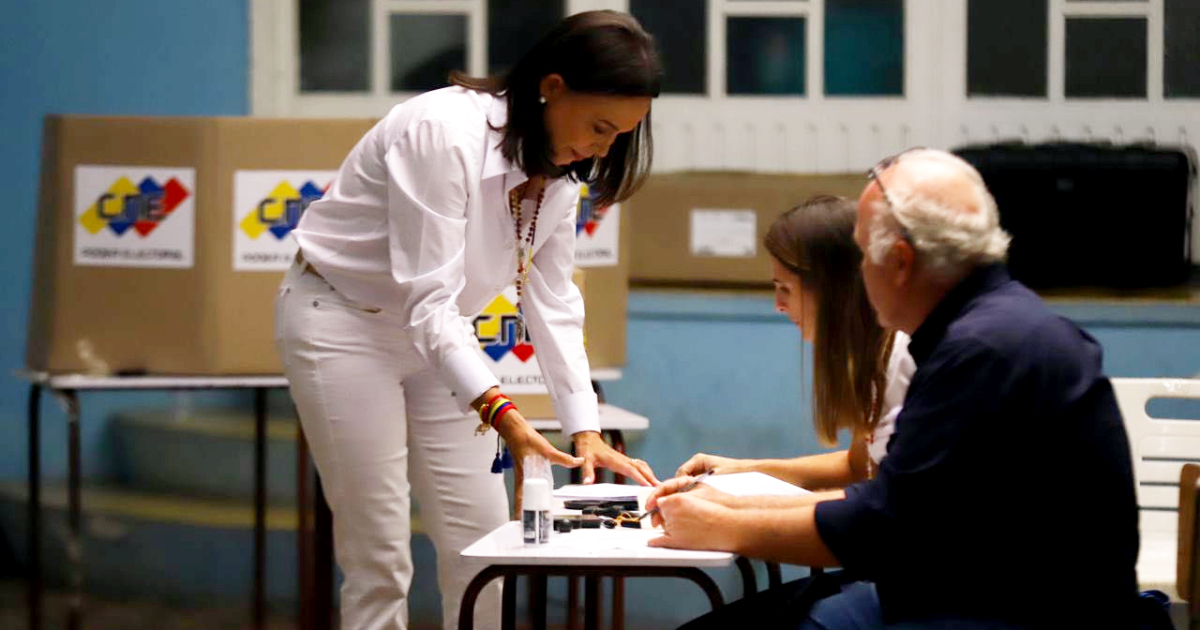The struggle for power in Venezuela remains unresolved after the authorities loyal to the Chavista regime declared Nicolás Maduro as the re-elected president amidst allegations of fraud from the opposition coalition. To substantiate their claims, the opposition has released the voting records they managed to safeguard from the polling stations.
"Venezuelan, through this link, you can see how your vote and your will have changed the history of Venezuela. Here you will find the records we have processed and tallied so far, confirming our extraordinary victory," stated opposition leader Maria Corina Machado in a tweet. Her post included a link to a webpage containing the data collected by the opposition from various polling stations, despite numerous obstacles and ploys by the regime to prevent transparency in reporting the results.
Massive Election Fraud in Venezuela
According to the information compiled in this database, a massive fraud took place in Venezuela this Sunday. While the official data awarded Maduro 51.2% of the votes compared to 44.2% for Edmundo González, the opposition's count shows that 73.25% of the records confirm Edmundo González Urrutia's victory by a margin of 4 million votes.
"We now have the means to prove the truth of what happened at the polls. The difference was overwhelming; we won in every state," Machado said in a press conference alongside González. The opposition's count resulted in 2,759,256 votes for Nicolás Maduro versus 6,275,182 votes for the opposition candidate.
"Some wonder why the opposition insists on the issue of the records and doesn't just call for rebellion. These records will allow them to claim they are the true winners to the growing number of countries awaiting the tally data before recognizing, or not recognizing, Maduro (including all the most relevant Western countries and the majority of Latin America). It's not all about testosterone; there's also synapse," explained Argentine journalist, writer, and international political analyst Ignacio Montes De Oca on his social media.
This strategic move, hailed as a masterstroke by international observers, will enable the opposition to demand that Maduro's regime respects national sovereignty and will put additional pressure on the Venezuelan armed forces. The military will have to decide whether to maintain the Civil-Military Union created by the dictatorship with advice from Havana or return to the democratic path and acknowledge civilian supremacy over the military, which is characteristic of democratic systems.
"The regime slept very worried, and we didn't sleep because we were busy collecting evidence. (...) I want to tell you that we have 73.3% of the records at this moment, and with this result, our elected president is Edmundo González Urrutia," Machado asserted this Monday from the Comando Con Venezuela, the political headquarters of the opposition coalition.
The opposition leader emphasized that, with this result, Nicolás Maduro would have no way to catch up to the opposition leader. "Even if the National Electoral Council (CNE) gives him 100% of the remaining votes," she concluded.
The political leaders assured that all recovered records would be available starting Monday night on a highly secure website, and anyone with a Venezuelan document could access the site to verify the authenticity of their claims. Additionally, acknowledging the spontaneous protests that have arisen in response to the apparent fraud, Maria Corina Machado called for a peaceful demonstration this Tuesday, July 30, at 11:00 AM (Venezuela time).
FAQs on Venezuelan Election Fraud Allegations
Here are some frequently asked questions and answers regarding the recent allegations of election fraud in Venezuela and the opposition's response.
What evidence has the opposition presented?
The opposition has released voting records from polling stations, showing a significant discrepancy between their count and the official results declared by the Chavista authorities.
How did the opposition gather the voting records?
The opposition collected the voting records from various polling stations despite numerous obstacles and efforts by the regime to prevent transparency.
What are the implications of these findings?
These findings could amplify international pressure on Nicolás Maduro's regime and potentially lead to a reevaluation of the election results by other countries and international bodies.
